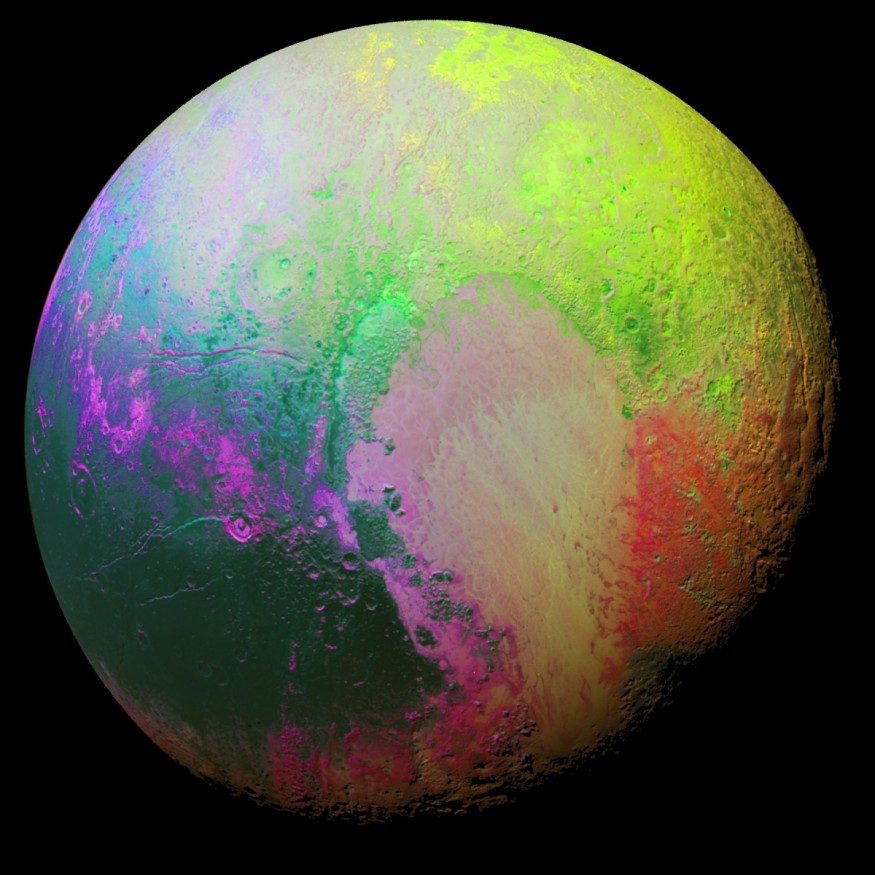Pluto may be demoted as a dwarf planet, but that does not stop scientists from studying it. The dwarf planet is located in the Kuiper Belt, the donut-shaped region outside of Neptune, and was demoted in August 2006 by the International Astronomical Union (IAU).
In search of life outside Earth, astronomers have been studying planets within the Solar System, including dwarf planets like Pluto. Scientists have been taking photos of Pluto in various ways and it is clear that the New Horizons probe has a few surprises up its sleeve after producing a rainbow-colored psychedelic photo of Pluto some years ago.

Rainbow-Colored Psychedelic Pluto
NASA first shared the photo of a rainbow-colored psychedelic Pluto on November 13, 2015, showing how the New Horizons spacecraft can produce vibrant colors from the drab-looking dwarf planet. They reshared the image this month via their official Instagram account, which received more than 542,000 likes as of writing.
The key to this image is the infrared spectrometer of the spacecraft. According to NASA, New Horizons scientists made the false color image of Pluto using the principal component analysis technique that highlights the subtle color differences in the distinct regions of Pluto.
The spacecraft's Ralph/Multispectral Visual Imaging Camera (MVIC) collected the image during a flyby of the dwarf planet on July 14, 2015, at 11:11 AM UTC from a 22,000-mile (35,000-kilometer) range.
The linearly-varying infrared filter shows a stained glass window effect as it looks for reflected chemicals, wherein the dark bands from the methane ice of Pluto absorb those materials. The scientists plugged the results into colorful channels and created an almost festive mix of red, green, and hints of blue colors, as seen in the image.
Will Grundy of the New Horizons' surface composition team presented the image on November 9 during the Division for Planetary Sciences (DPS) meeting of the American Astronomical Society (AAS) in National Harbor, Maryland.
In July that year also, New Horizons captured a high-resolution enhanced color image of Pluto that combines the blue, red, and infrared images by the MVIC. Pluto has a remarkable surface that ranges of distinct colors that tell complex geological and climatological stories that have just been recently decoded.
View the full resolution of the image to fully appreciate the complexity of the features of the planet's surface.
Why Create the Psychedelic Pluto Photo?
Aside from the psychedelic Pluto image taken that year, NASA shared other images a month earlier that showed Pluto's hazy crescent, its tiniest moon, which is only about five miles across, and its largest moon.
The images taken of Pluto are not just meant as art, Engadget reported. Infrared scans serve an essential purpose in confirming the presence of water ice on Pluto, wherein the data analysis should help scientists understand the evolution of the dwarf planet and its main moon, Charon. They believe the images could change people's outlook on how the Solar System was formed.
The images have proven to be highly beneficial for the American space agency because they made 50 new discoveries, such as the icy volcanoes on Pluto, and also found "drunken" spinning moons. More so, it has allowed scientists to determine that the dwarf planet could also be over 4 billion years old.
RELATED ARTICLE: Pluto is Covered In Huge Red Patches; Scientists Don't Know What It Is
Check out more news and information on Pluto in Science Times.










